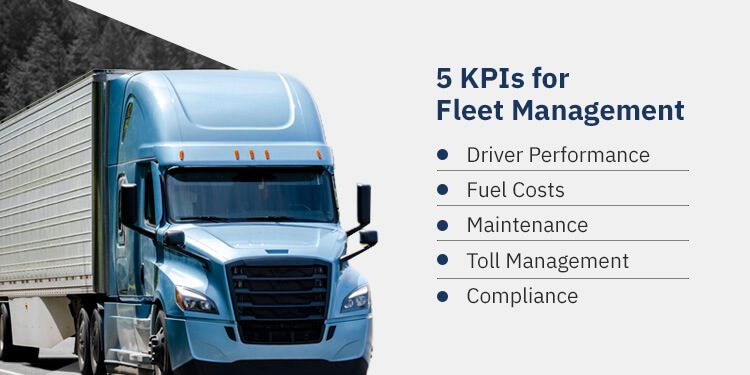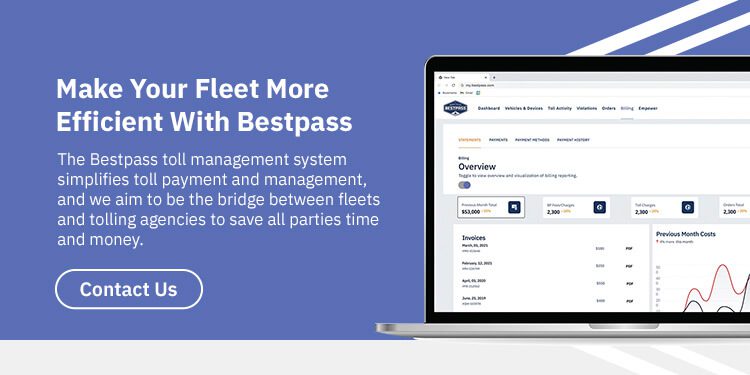5 Trucking Fleet KPIs You Should Be Tracking
Like any industry, the trucking industry faces many obstacles. Changing labor regulations, increasing insurance costs and fluctuating fuel prices are just some of the challenges confronting the trucking industry. One way to address and overcome them is by focusing on improving fleet management.
Implementing fleet management key performance indicators (KPIs) can help you manage costs, extend equipment life spans and improve driver behavior. They can also help you develop strategies to improve customer satisfaction and productivity. Some of the most important KPIs for fleet management focus on driver performance, fuel costs, maintenance, toll management and compliance.
What Are Fleet Management KPIs?
KPIs are the best way to measure the effectiveness and success of your fleet management strategy. They allow you to observe and document fleet management metrics, including driver behavior, compliance and fuel costs. KPIs use historical data to set targets that can help you control costs, increase productivity and be more efficient.
The three main fleet performance metrics are:
- Efficiency
- Costs
- Productivity
Tracking each of these can help you understand your fleet’s performance, identify areas of improvement, develop strategies to enhance performance and track goal progress.
Why Are KPIs Important?
KPIs help fleet managers understand individual drivers’ and fleet performance. KPIs ensure you are gathering data from multiple sources, helping to evaluate the effectiveness of current productivity and cost control measures. They can also be used to identify safety concerns and unsafe driver behavior.
Here are five ways tracking KPIs can enhance fleet performance:
- Managing vehicle use: Monitoring assets can help you identify any abnormal vehicle usage, including unauthorized use after hours, unnecessary detours or delivery delays. Any deviations from typical fuel usage or maintenance schedules may indicate assets are being used abnormally.
- Monitoring asset and driver safety: Tracking drivers’ acceleration, breaking and speed metrics can identify unsafe driving behaviors and habits. Vehicle maintenance and repair reports can reveal if any assets have more serious safety concerns that need to be addressed.
- Controlling costs: Trucking KPIs are based on past fleet performance. This data can be analyzed to identify areas where costs can be reduced and controlled more effectively. For example, creating a preventive maintenance plan for assets instead of waiting for parts to break down before repairing them. A detailed maintenance, repairs and replacements schedule can limit downtime and cut costs.
- Improving customer satisfaction: KPIs can help fleets become more efficient by streamlining the loading and unloading of trucks and delivery routes to ensure orders are delivered on time.
- Tracking compliance: Tolls, citations and other violations are common in fleets. As KPIs track fleet performance, they can help drivers become more compliant and avoid citations and violations.
5 KPIs for Fleet Management

Every aspect of your fleet can be tracked through KPIs. Fleet managers can create fleet management KPIs for everything from how long an asset spends idling to how often vehicles pass through tolls. If you want to improve fleet performance, here are five KPIs you should be tracking:
1. Driver Performance
One of the most important KPIs for fleet management is driver performance. Knowing how drivers perform and their routes can reveal unsafe driving habits or improper route adherence. You can split driver performance into seven sections, including:
- Engine starts and stops: Monitor when drivers are driving or taking breaks. Starting late or taking long stops can lead to unsafe driving to compensate for lost time. Drivers should also turn engines off when loading or unloading flammable or volatile substances. Engine monitoring ensures drivers follow proper safety procedures.
- Speeding: One of the most significant contributors to traffic fatalities is speeding. In 2020, it contributed to 29% of all traffic fatalities in the United States. Monitoring speed using GPS tracking can help decrease the risk of accidents, improving driver safety.
- Acceleration: Excessive and rapid acceleration can signify careless driving. Tracking when and where drivers accelerate can help you modify this behavior.
- Braking: Inattention may cause harsh and sudden braking, leading to accidents or spillages. It can also contribute to vehicle wear and tear.
- Idling: Monitoring idling can cut fuel usage and carbon emissions. While a certain amount of idling is expected due to congestion, excessive idling should be monitored and corrected as soon as possible.
- Compliance: Drivers need to adhere to road rules, such as following speed limits and making turns appropriately. Disregarding these rules can lead to costly accidents.
- Route adherence: Delivery routes are designed to reach as many delivery points as possible in the shortest time. If drivers deviate from these routes, they can cause significant delays. Monitoring route adherence can identify potential optimization opportunities or unnecessary detours.
2. Fuel Costs
Fuel is one of the largest expenses for any fleet. As the price of fuel continues to fluctuate, it is crucial to monitor fuel consumption to find ways to improve fuel efficiency.
Fuel consumption is multifaceted. It is affected by driver behavior, routes and the condition of your trucks. Your fuel cost KPI will likely rely on developing strategies to improve driver performance, optimize routes and keep vehicles in peak condition.
3. Maintenance
A preventive maintenance schedule helps reduce downtime and minimizes costs. Unexpected repairs or maintenance can put vehicles out of commission, delaying shipments.
Knowing when to replace parts can eliminate unforeseen expenses due to equipment failure. Closely monitoring vehicle usage and the time between services can keep trucks in optimal condition, improving fuel efficiency, extending their life spans and reducing the possibility of an accident.
4. Toll Management
Tolls are a significant part of trucking. As fleets cross state and national borders, they often must pay tolls. Several aspects of toll management can result in higher costs and delivery delays.
Effective toll management can improve productivity, reduce costs and enhance customer satisfaction. Consider using a toll management solution to simplify the process and help you meet your KPIs.
5. Compliance
Commercial trucking fleets need to comply with specific regulations. To do so, vehicles must undergo regular inspections. Implementing a fleet management KPI that tracks inspection completion can help keep your fleet compliant and ensure you avoid citations or fines.
Make Your Fleet More Efficient With Bestpass
Creating KPIs for fleet management can help you make your fleet more efficient and productive. If you find that you need to streamline toll management, we can help. The Bestpass toll management system simplifies toll payment and management, and we aim to be the bridge between fleets and tolling agencies to save all parties time and money.
Learn More About Bestpass Today
Discover more about our toll management solutions for fleets and owner-operators today. Learn more about how we can customize solutions to your unique fleet needs.


